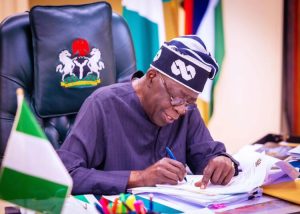
As Nigeria prepares for a significant reshaping of its foreign policy, President Bola Tinubu’s administration has begun deploying consular officers to diplomatic missions across the globe. This move is seen as a precursor to the long-awaited release of a new ambassadorial list, which is expected to fill the vacuum left by the recall of 83 ambassadors in September 2023.
A Shift in Diplomatic Strategy
The recall of both career and non-career diplomats was a key part of the government’s reassessment of its foreign policy priorities following Tinubu’s inauguration. The ambassadors were instructed to return to Nigeria by October 31, 2023, signaling a shift in diplomatic strategy aimed at realigning the country’s global engagements.
Foreign Affairs Minister, Ambassador Yusuf Tuggar, explained that the decision was made in line with the President’s prerogative, emphasizing that the recall was part of a broader strategy to strengthen Nigeria’s international representation. However, the lack of immediate replacements has left a significant diplomatic void, raising concerns within the diplomatic community and among foreign policy experts.
While the government had initially indicated that the new appointments would be made swiftly, no ambassadors have been named as of yet, leading to frustration within the Ministry of Foreign Affairs and diplomatic circles.
The Interim Measures and Their Limitations
In the wake of the ambassadorial recall, the government took interim measures, appointing 12 consuls-general and five chargés d’affaires to represent Nigeria in 14 countries. While these officers are capable of handling routine administrative duties and overseeing day-to-day operations, they lack the authority to engage in high-level diplomatic negotiations or represent Nigeria at the highest levels of government.
These limitations have only highlighted the ongoing leadership vacuum, as consuls-general and chargés d’affaires are not equipped to meet with heads of state or engage in critical international discussions. In April 2024, the government began deploying consular officers to fill some of the gaps, though the issue of leadership at the diplomatic level remains unresolved.
The Delayed Appointment and Budget Constraints
A major factor behind the delay in appointing new ambassadors has been attributed to funding constraints. Minister Tuggar acknowledged in May 2024 that the lack of sufficient budgetary allocations had been a primary obstacle in finalizing the new appointments. Former Ministry of Foreign Affairs spokesperson, Ambassador Eche Abu-Ode, suggested that the release of funds in a supplementary budget might be necessary before new appointments can be made.
This delay mirrors a similar pattern from the previous administration, when ambassadorial appointments took as long as 20 months under President Muhammadu Buhari. The prolonged absence of permanent ambassadors has raised alarm among diplomats, who fear that the inaction may be interpreted by Nigeria’s international partners as a sign of instability or disengagement from global affairs.
Retired diplomats have also weighed in, stressing the importance of having resident ambassadors in key missions. Ambassador Rasheed Akinkuolie warned that the absence of high-level representation could damage Nigeria’s diplomatic standing, particularly at a time when the country is working to attract foreign investments and strengthen international partnerships.
“It is not the best option not to have resident ambassadors at a post,” Akinkuolie explained, noting that chargés d’affaires generally only have the authority to engage with foreign ministries, not heads of state or key government officials.
A Temporary Solution with Long-Term Implications
As the government works to finalize its new ambassadorial appointments, the deployment of consular officers to countries such as Malaysia, Spain, and Brazil is being seen as a temporary solution. Some officers have already assumed their new roles, while others are expected to follow later this month. These deployments are intended to address the immediate diplomatic gaps, but without permanent ambassadors, Nigeria’s ability to fully engage at the highest diplomatic levels remains limited.
A senior government official confirmed that consular officers have been posted to various missions to ease the burden on the diplomatic community. “Yes, some of us left last week. Others even left the last two weeks. But I’m going later this month,” one officer explained, highlighting the ongoing efforts to shore up Nigeria’s diplomatic presence abroad.
Calls for Reform and Streamlined Processes
Despite the government’s efforts to address the diplomatic leadership vacuum, experts and retired diplomats are calling for more comprehensive reforms to ensure the country’s diplomatic missions are well-staffed and properly funded. Ambassador Ogbole Amedu-Ode and Akinkuolie have both advocated for a more streamlined process to appoint ambassadors, suggesting that Nigeria’s foreign missions should be funded through dedicated dollar accounts at the Central Bank of Nigeria to avoid the delays caused by domestic budgetary constraints.
Diplomatic sources have also emphasized the need for greater communication and clarity on the timeline for the new appointments. A senior official in the Ministry of Foreign Affairs expressed frustration over the lack of transparency, saying, “There is silence on the issue. Nobody knows what’s going on.”
As Nigeria awaits the release of the new ambassadorial list, all eyes remain on President Tinubu’s next steps in reshaping the country’s foreign policy and strengthening its diplomatic presence on the global stage. With key international engagements and partnerships at stake, the appointment of new ambassadors is seen as a critical step in restoring Nigeria’s influence and improving its foreign relations.

